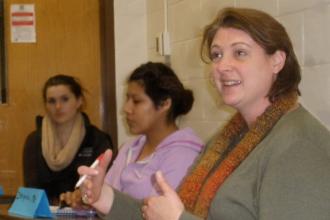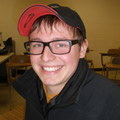"Climate Challenged Society” (ENVS 1000) excites students across disciplines
Olga Bonfiglio
College of Arts and Sciences Staff Writer
As students come into the room, they immediately move desks around to form a discussion circle. Dr. David Benac, history, will conclude his week as guest lecturer about the development of climate change perceptions, historical context and policy as students share their research on American news and science coverage of climate change during the 1970s and 80s.
Benac is one of 10 professors providing expert guest lectures from key disciplines for “Climate Challenged Society” or ENVS 1000, the introductory course for the new climate change studies minor instituted last fall. At times, Benac defers to Dr. Steve Kohler, Environmental & Sustainability Studies Program, or Dr. Denise Keele, political science, the lead instructors and facilitators for the course, for scientific and political details. At other times he invites students to recap or reflect on the different policy developments he's just described.
The students of the class seem satisfied, enlightened and engaged with today's discussion, but before they leave, Benac gives them a list of courses he will teach that relate to the environment and may be applied to the climate change studies minor.
Last fall, the minor was added to the undergraduate curriculum to apply to any major as preparation for a variety of 21st century professional fields.
It was created by an interdisciplinary working group of WMU faculty members, the Interdisciplinary Humanities Group for the Study of Climate Change, sponsored by the WMU Center for Humanities.
Sensing that climate change is the most important issue facing humankind, one of the major goals of this group was to infuse climate change into the liberal arts education.
"It was time for us to move beyond the science and let students understand the world they live in,” said Keele, who serves as chair of the advisory board for the climate change studies minor. “There are challenges coming and our real hope is to teach students something that will be useful to their lives and the future."
Students seem to get it as 27 of them filled this initial course offering. Three students talked about their motivations for taking the class, the minor and their insights about climate change and sustainability.
David Bere is a senior from Kalamazoo who is majoring in political science. He has a passion for bicycles: building them, traveling on them and promoting them as alternative transportation. Although he is not sure of his direction after graduation, he is intensely interested in sustainability.
“I got into bikes through my volunteer work with the Office of Sustainability two and a half years ago,” said Bere. “After six months of volunteering, I was hired for a student assistant job.”
Bere took ENVS 1000 because he had Dr. Keele for environmental law and liked her. He also needed a minor and decided on the climate change studies minor.
“Environmental issues are critically important,” he said. “Every day of my life I face choices that affect the environment. In fact, this issue is on everyone's mind in my generation—more than it was in the past, I think. I feel like I serve as an ambassador between generations.”
Bere said that making small choices every day about how to live is not that hard. Instead, it becomes part of one's consciousness. Perhaps that's what got him started working with bicycles and teaching other students how to fix them.
“I have a new appreciation for the energy it takes for the things I use, so I'm always looking for energy alternatives. My focal point is finding ways to make everything sustainable. I may end up an entrepreneur doing something with energy alternatives.”
Alex Farr, a senior political science major from New Baltimore, took ENVS 1000 because he also liked Dr. Keele's environmental law course and wanted more background on climate change.
“The environment plays a huge role in my life, particularly on the policy side, so I'm exploring environmental law programs, he said. “Policy is the most effective way to change things, and I can't think of anything more important than the environment. Without a healthy environment, nothing else matters.”
As an opinion columnist for the Western Herald, Farr already sees the impact he can make through the written word. He received “tons of feedback” on his recent column advocating bicycles for WMU parking services.
Farr's sensitivity for the environment comes primarily from his family, especially his “hippy grandmother.” He grew up in a neighborhood near a landfill that occasionally emitted a bad smell. He also learned about sustainability in elementary school where students found ways to “reduce, reuse and recycle.”
“The BP oil spill in the Gulf of Mexico in 2010 really fired me up,” he said, “as well as the company's delayed response.”
Farr sees Americans coming around to more sustainable futures, but feels it is taking far too long because the issue is framed as a business vs. the environment conflict—with business deemed more important.
“I want to have kids someday,” he said, “but I don't want to bring them into a world that is environmentally unstable.”
Farr would have added the climate change studies minor to his program had it been offered earlier in his college career. He sees Keele as the perfect person to lead ENVS 1000 because she is both motivated by the subject and “incredibly knowledgeable.”
“She's also involved in community environmental projects, so she has a great deal of credibility.”
Farr participated in one of Keele's community projects as a canvasser for a proposed superfund site at the Allied Paper Mill in Kalamazoo.
He recognizes that some people feel hopeless about climate change, but he believes that through politics he can make a difference in reversing the catastrophes it forebodes.
“We can't just throw up our hands and not do anything,” he said. “By not acting on the problem, you become part of the problem. I'm young and ready to fight for the environment. And the more people who fight for it, the better off we'll all be. There are no second chances.
Ali Coutts, a senior Honors College student from Grosse Pointe, decided to major in environmental studies because she wants to educate citizens about climate change and the importance of community and local advocacy.
“I think climate change is extremely important. It’s happening now and nothing will change it unless we learn what to do about it.”
For example, on a small scale people can buy local products or ride bicycles, she said. On a larger scale people need to know what government is doing and then vote for environmentally-oriented candidates.
During her college years Coutts has interned with Greening of Detroit, a collaborative group of organizations whose aim is to inspire “sustainable growth of a healthy urban community through trees, green spaces, food, education, training and job opportunities.”
However, what she’s discovering in the ENVS 1000 class is that even though students and faculty come from different disciplines, they are concerned about climate change and what they can do about it.
“It’s extremely enlightening to find out that climate change touches so many different disciplines,” said Coutts who hasn’t taken courses in physics, advanced English literature, or history. “But they’re all a part of ENVS 1000, and now I’m exposed to these perspectives on climate change, which ultimately broaden my perspective.
Coutts reported that other members of the class—art students, business students, anthropology students and English students—are all worried about climate change.
“I thought it was just us environmental studies majors who cared. I’m glad to be sadly mistaken.”
In fact, she believes saving the environment is definitely an issue for her generation and that most students have already been exposed to the facts about climate change.
“That alone gives us a greater sensitivity to the issue as well as a greater advantage to doing something about it,” said Coutts.
Keele is very pleased with student and faculty response to the climate change studies minor and the ENVS 1000 course. The minor was created by a working group of over 20 faculty from the Interdisciplinary Humanities Group for the Study of Climate Change, and is administered by a seven-member interdisciplinary faculty advisory board.
“They are the most dedicated, hard-working people I know on this issue. They spent all of summer 2014 to put together the program,” said Keele. “These people care, and they want to make sure our students are prepared. They also want to make sure WMU makes a good start in this area—and I think they succeeded.”
ENVS 1000 provides students with the necessary science-based background and a broad understanding of the human relationship to climate change, including the social and environmental causes, challenges and opportunities for mitigation and adaptation. The goal of the program is to develop informed and engaged citizens who can use information from multiple disciplines to draw appropriate conclusions and constructively contribute to societal adaptation to global environmental change.
Four courses in the minor are offered in Spring 2016 and the goal is to have at least 20 students minoring in Climate Change Studies by next year, said Keele.
One of two options to enter the minor, Climate Challenged Society (ENVS 1000), is led and facilitated by Keele and Kohler with week-long guest lectures taught by Allen Webb, English; David Benac, history; David Karowe, biological sciences; Lei Meng, geography; Duane Hampton, geosciences; Steve Bertman, chemistry; John Miller, chemistry; Paul Pancella, physics; Carson Reeling, economics.
“Climate change can be a depressing issue, but our students are faced with questions about how to be in a world experiencing climate change and how they can support each other in it,” said Keele. “Now, that's an accomplishment!”
Climate change studies advisory board members:
Steve Bertman, Chemistry
James Cousins, CAS Dean’s Office
Lisa DeChano-Cook (Program Adviser), Geography
Duane Hampton, Geosciences
Dave Karowe, Biological Sciences
Denise Keele (Chair), Political Science, Environmental and Sustainability Studies
Allen Webb, English





